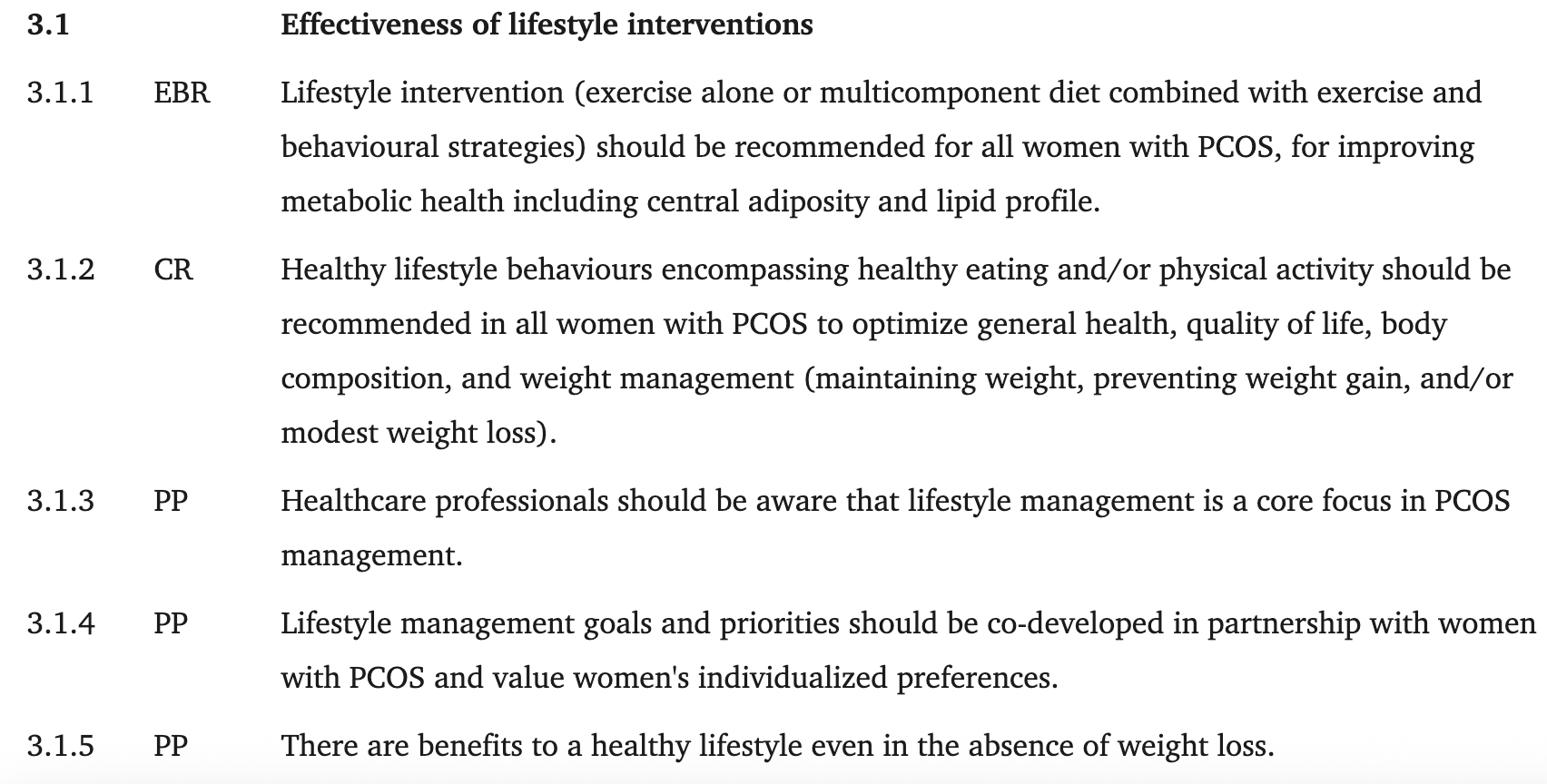Why Lifestyle Changes Matter for PCOS
PCOS affects everyone differently, but common challenges include insulin resistance, hormonal imbalance, and chronic inflammation. Research consistently shows that lifestyle interventions are first-line treatment for PCOS.
Even modest improvements, like 5–10% weight loss, can enhance insulin sensitivity, reduce androgen levels, and restore ovulation for many women. Encouragingly, benefits often appear before significant weight changes, highlighting the importance of sustainable, quality lifestyle adjustments.
Supporting your body through nutrition, movement, sleep, and stress management helps manage PCOS symptoms and improves overall health.

Nutrition for PCOS: Practical, Sustainable Tips
Extreme dieting can backfire and lead to cycles of deprivation and overeating. Focus instead on balanced, sustainable nutrition:
- Include protein at every meal – eggs, Greek yogurt, chicken, or fish help stabilize blood sugar and keep you satisfied.
- Pair carbohydrates with fiber and protein – whole grains, beans, or fruit with nut butter improve blood sugar control.
- Eat regularly – aim for a snack or meal every 4–5 hours to maintain energy and regulate appetite.
- Stay hydrated – adequate water supports metabolism, digestion, and energy.
Foods That May Support PCOS
Some foods can help with insulin sensitivity and hormone balance:
- Apple cider vinegar – 1–2 tablespoons daily may help with post-meal blood sugar.
- Ground flaxseed – 1–2 tablespoons daily can support hormone balance through lignans.
- Soy protein – 20–25 grams daily from tofu, tempeh, soy milk, or edamame may improve insulin response.
- Spearmint tea – 2 cups daily may modestly reduce testosterone levels and support hormone balance.
Foods to Consider Reducing
- Sodium – aim for under 2,300 mg/day for heart health.
- Dairy – skim or low-fat milk may worsen acne in some women.
- Chocolate – monitor for flares if acne is a concern.
Movement and PCOS: Start Where You Are
Exercise supports insulin sensitivity, hormone balance, and overall well-being. You don’t need intense workouts to see benefits – any consistent activity counts.
- Aim for 150 minutes of moderate activity weekly (e.g., brisk walking, skating, biking) or 75 minutes vigorous activity (running, basketball, cross-country skiing).
- Include strength or resistance training twice a week – bodyweight exercises, resistance bands, or lifting groceries count.
- Reduce sedentary time – walk during calls, stretch during TV, or take the stairs.
- Make movement enjoyable – dancing, gardening, or playing with pets can keep you active without feeling like a chore.
Sleep: Restore Hormonal Balance
Poor sleep can worsen insulin resistance, elevate cortisol, and disrupt hormone regulation. Women with PCOS are more likely to experience sleep challenges like insomnia or sleep apnea.
Sleep Support Tips
- Maintain consistent sleep and wake times.
- Create a 30–60 minute wind-down routine (dim lights, avoid screens, gentle stretching).
- Keep your bedroom cool and dark (60–67°F).
- If you can’t sleep, engage in a calming activity until you feel ready.
Stress Management: Realistic Strategies
Chronic stress impacts cortisol, insulin, and ovulation. Women with PCOS often face higher rates of anxiety and depression, which can worsen symptoms.
Practical Stress-Reduction Tips
- Try 4-7-8 breathing – inhale 4, hold 7, exhale 8.
- Set micro-boundaries – e.g., no emails after 8 PM.
- Find a calm anchor – morning coffee in silence, listening to a favorite song, or stepping outside for fresh air.
- Consider herbal supports like ashwagandha, rhodiola, or holy basil after discussing with a naturopath.
Alcohol and PCOS
Moderate alcohol can affect blood sugar and liver function, both of which are already challenged in PCOS. If you choose to drink:
- Pair with food.
- Stay well-hydrated.
- Observe how it affects your energy, sleep, and symptoms.
Consistency Over Perfection
Small, consistent lifestyle changes are more effective than perfect but unsustainable routines. Focus on:
- Recognizing the benefits of healthy habits.
- Overcoming barriers with support from family or friends.
- Celebrating small victories along the way.
Start with one manageable change – a tablespoon of flaxseed in your smoothie, a 10-minute walk, brewing spearmint tea, or a consistent bedtime. After 2–3 weeks, add another small step. Patterns matter more than perfection.
Taking the Next Step in Ontario
If you’re looking for personalized support managing PCOS, a naturopathic doctor can help you create a plan tailored to your lifestyle and goals. With guidance on nutrition, exercise, sleep, stress, and natural approaches, you can take meaningful steps toward improved hormone balance, energy, and overall well-being.
Your body is resilient. With patience, self-compassion, and consistent effort, lasting change is possible. You’ve got this – one small step at a time.
Are you looking for a naturopath in Ontario to create a personalized health plan to support your PCOS? Let's Chat!









